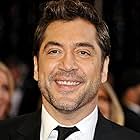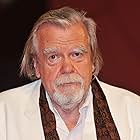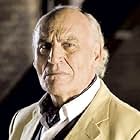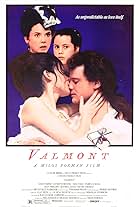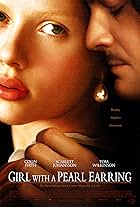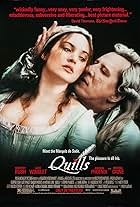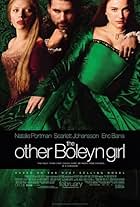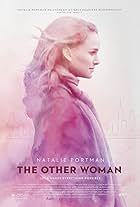Painter Francisco Goya faces a scandal involving his muse, who is labeled a heretic by a monk.Painter Francisco Goya faces a scandal involving his muse, who is labeled a heretic by a monk.Painter Francisco Goya faces a scandal involving his muse, who is labeled a heretic by a monk.
- Awards
- 2 wins & 5 nominations
- Director
- Writers
- All cast & crew
- Production, box office & more at IMDbPro
Storyline
Did you know
- TriviaWhen asked why a film about such a quintessentially Spanish artist was made in English, the director replied "I don't speak Spanish."
- GoofsWhen Goya unveils the unflattering portrait of the queen, she is deeply offended. Actually, queen Maria Louisa liked that portrait so much that she made Goya the first court painter.
- Quotes
[Bonaparte and Lorenzo are looking at paintings of Maria Luisa]
Joseph Bonaparte: I met her once... don't recall her being quite so ugly though. How did she have so many lovers?
Brother Lorenzo: [smiling] She was the Queen, Your Majesty.
Featured review
I read someone else's comment on IMDb (much more adulatory than I would be for Goya's Ghosts), who said that it was a masterpiece not only for Milos Forman and co-writer Jean-Claude Carriere, but for Luis Bunuel too. And that intrigued me even more than I was already in anticipation for the film, merely before as a Forman fan. Upon seeing it I can understand the enthusiasm, and had a kind of private, nearly perverse pleasure in recognizing (maybe too obviously on a subjective level) little things that popped up when Carriere and Bunuel collaborated on some of the late master's best works. On the other hand, for those not too familiar with films like the Phantom of Liberty, the Milky Way or That Obscure Object of Desire, Goya's Ghosts may seem like strong, strange film-making that starts to go a little more haywire after the half-way title card "15 Years Later" (possibly another in-joke for Un Chien Andalou fans) pops up. But it's not only certain things regarding the line between true drama and surrealism that marks Forman's latest as something interesting.
Matter of fact, it is a flawed film, notably in the casting of Stellan Skarsgaard as Goya himself. Why cast a Swedish actor, who usually isn't necessarily bad in the character-actor parts he takes on, in the role of one of the most decadent and ribald *Spanish* artists in the past 250 years of worldwide painting? Skarsgaard doesn't do too much to elevate the part outside of being the guy on the sidelines, dramatically trying to not get too much into the situations, at first, but then soon becoming like a match-maker in the second half when "daughter" drama happens between an ex-"Brother" and an ex-prisoner-of-inquisition. And yet, there is perfect casting in having Barden as the Brother Lorenzo, who doesn't change in how he tries to push aside any of the problems in his life that he doesn't want to deal with, be it questions of real faith, taking care of a certain lost woman, and his illegitimate child, even as he changes from man of the cloth to revolutionary in several years time. Seeing him in the first half in that black robe, his eyes dark and leering of Goya and even the Church to an extent, it's not wonder that he's one of the most sought-out actors of his time. And even better then that, as far as conventions go, he gets the truest kind of arc with his character.
Then there's Natalie Portman who, as probably as something of both an in-joke/reversal of the tactic used in 'Obscure Object' with two actresses playing the same woman, and a sort of disintegration-of-soul aspect that Forman might be after ambivalently, embodies the crushed innocence of repressive religion. Ines is tossed into a prison following a confession- whether true or not is left nicely vague- that she's Jewish following a questioning of what she ate, and left for more than a decade. Seeing her in this section it's clear she's lucid in her presentation of a simple characterization: sweet and naive, then later torn into oblivion by insanity and a near absurd desperation to find the child she birthed while in prison. When she plays the daughter it's a little more flat and pat, as all we see of her is as a 14 year-old (yes, 14 year-old) harlot. This mixed-up matching of actors (plus a few bits with Randy Quaid as a well-played pudgy king) is set to a backdrop of Spain where society is merciless and without much compromise unless the regime changes, which is towards one way (the ultra strict Catholics) or the other (the flawed Napoleon revolution people). Meanwhile, Goya, deaf, sketches away in drawings that today seem right out of graphic novels.
As mentioned, one may get some moments of random surprise as opposed to fully stark costume drama; the first appearance of Portman's daughter played by herself is a little doozy; the way the cardinal tells his choir boy to keep reading the passage even as the French soldier on horseback rides in with a decree, then shoots the boy midway through; the emergence of the British army going towards and swarming around a cart of 15 prostitutes left out in a field; the very last scene, where a cart carrying a dead man is followed by...say no more. So there is a drawback, or more than one at any rate, to Forman going for telling about the nature of the society around Goya than too much about Goya himself. It is a disappointment too to not get entirely, aside from the 'her face haunts me from that painting' logic, as to why Goya is so infatuated with Ines and her plight in the first place. There's not much to be seen into the man who drew such scandalous drawings whilst being the king's painter. What we get instead, which is intriguing and involving, if not totally successful, a story of corruption from the 'Powers-That-Be', and when it strikes at this Forman and Carriere get some good, juicy entertainment.
Matter of fact, it is a flawed film, notably in the casting of Stellan Skarsgaard as Goya himself. Why cast a Swedish actor, who usually isn't necessarily bad in the character-actor parts he takes on, in the role of one of the most decadent and ribald *Spanish* artists in the past 250 years of worldwide painting? Skarsgaard doesn't do too much to elevate the part outside of being the guy on the sidelines, dramatically trying to not get too much into the situations, at first, but then soon becoming like a match-maker in the second half when "daughter" drama happens between an ex-"Brother" and an ex-prisoner-of-inquisition. And yet, there is perfect casting in having Barden as the Brother Lorenzo, who doesn't change in how he tries to push aside any of the problems in his life that he doesn't want to deal with, be it questions of real faith, taking care of a certain lost woman, and his illegitimate child, even as he changes from man of the cloth to revolutionary in several years time. Seeing him in the first half in that black robe, his eyes dark and leering of Goya and even the Church to an extent, it's not wonder that he's one of the most sought-out actors of his time. And even better then that, as far as conventions go, he gets the truest kind of arc with his character.
Then there's Natalie Portman who, as probably as something of both an in-joke/reversal of the tactic used in 'Obscure Object' with two actresses playing the same woman, and a sort of disintegration-of-soul aspect that Forman might be after ambivalently, embodies the crushed innocence of repressive religion. Ines is tossed into a prison following a confession- whether true or not is left nicely vague- that she's Jewish following a questioning of what she ate, and left for more than a decade. Seeing her in this section it's clear she's lucid in her presentation of a simple characterization: sweet and naive, then later torn into oblivion by insanity and a near absurd desperation to find the child she birthed while in prison. When she plays the daughter it's a little more flat and pat, as all we see of her is as a 14 year-old (yes, 14 year-old) harlot. This mixed-up matching of actors (plus a few bits with Randy Quaid as a well-played pudgy king) is set to a backdrop of Spain where society is merciless and without much compromise unless the regime changes, which is towards one way (the ultra strict Catholics) or the other (the flawed Napoleon revolution people). Meanwhile, Goya, deaf, sketches away in drawings that today seem right out of graphic novels.
As mentioned, one may get some moments of random surprise as opposed to fully stark costume drama; the first appearance of Portman's daughter played by herself is a little doozy; the way the cardinal tells his choir boy to keep reading the passage even as the French soldier on horseback rides in with a decree, then shoots the boy midway through; the emergence of the British army going towards and swarming around a cart of 15 prostitutes left out in a field; the very last scene, where a cart carrying a dead man is followed by...say no more. So there is a drawback, or more than one at any rate, to Forman going for telling about the nature of the society around Goya than too much about Goya himself. It is a disappointment too to not get entirely, aside from the 'her face haunts me from that painting' logic, as to why Goya is so infatuated with Ines and her plight in the first place. There's not much to be seen into the man who drew such scandalous drawings whilst being the king's painter. What we get instead, which is intriguing and involving, if not totally successful, a story of corruption from the 'Powers-That-Be', and when it strikes at this Forman and Carriere get some good, juicy entertainment.
- Quinoa1984
- Aug 3, 2007
- Permalink
- How long is Goya's Ghosts?Powered by Alexa
Details
Box office
- Budget
- $50,000,000 (estimated)
- Gross US & Canada
- $1,000,626
- Opening weekend US & Canada
- $159,671
- Jul 22, 2007
- Gross worldwide
- $9,448,082
- Runtime1 hour 53 minutes
- Color
- Sound mix
- Aspect ratio
- 1.85 : 1
Contribute to this page
Suggest an edit or add missing content










